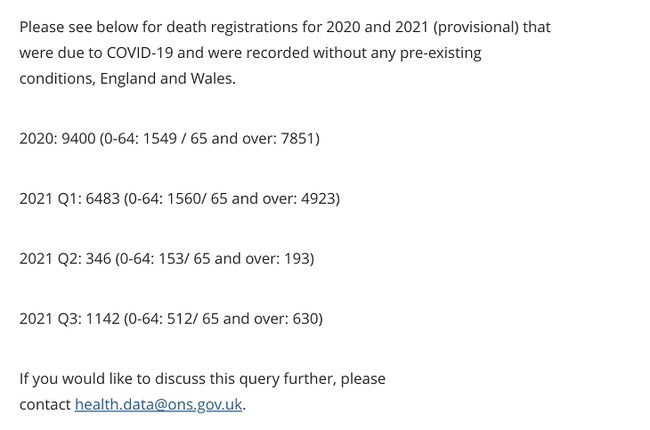On December 16th, the UK Office for National Statistics responded to a FOI request asking a simple question: “Can you advise on deaths purely from COVID with no underlying causes?”
The answer was surprising – not just for the numbers, but also for the fact that this data set, updated every couple of months, has been available to doctors, epidemiologists, data scientists, and public health policymakers all along. Perhaps they were ignoring it, or worse, perhaps they were all very aware of what it stated and unnecessarily took us down any number of paths, blatantly ignoring this information.

As of today, approximately 139,700 people have died in England and Wales from COVID. Of those, however, only 17,371 (as of Q3 2021) were in persons of any age with zero comorbidities.
That is 12.4 percent. of all COVID deaths in England and Wales. And of those 17,371 deaths, 78 percent. (13,597) were over the age of 65.
Since the beginning of the pandemic, until Q3 2021, only 3,774 of the people in England and Wales who succumbed to COVID-19 were healthy individuals with zero comorbidities under the age of 65 – approx. 2.7 percent. of all COVID-19 deaths in England and Wales.
What’s more astonishing is that unlike US data from the CDC – where, for some reason, collecting information on comorbidities has proven impossible, for no good reason at all – the English data sets also give a breakdown of what comorbidities are associated with COVID deaths. It isn’t quite what you’d think.
In 2020, most deaths had between one to two comorbidities. The leading comorbidities mostly included diseases such as dementia and Alzheimer’s disease, diabetes, hypertension, and chronic heart and pulmonary diseases – many of which, though not exclusive to the elderly, are overall more frequent among older populations. The trend was quite similar in 2021, with more deaths reporting comorbid diabetes but fewer, though still significant numbers, of deaths in patients with dementia.
One last interesting point regarding this data is that beginning in Q2 2021, the number of deaths in healthy, under-65 individuals from COVID drops off significantly. This corresponds to when vaccinations began to be widely taken up by the general population, showing a vastly reduced risk of death by COVID. It should be stated this is simply a correlation in time, as there is no data given here for how many of these deceased healthy individuals were vaccinated, unvaccinated, or partially vaccinated. Yet the decline is certainly significant, by an order of magnitude or so, as to the risk of death between Q1, Q2, and Q3 2021.
Given that this data set has been available since the beginning of the pandemic, there are two possibilities – the data set was either seen but ignored, or it wasn’t even on the radar of those making public health policy. One must assume, at least by what the eventual defenses of COVID policies will be, that policymakers did indeed see this data. So why then, after abjectly failing to protect the elderly in 2020, did they go on to enact public health policy that had wide-ranging, life-altering impacts on the entire under-65 population of the UK with all the evidence that healthy individuals were at marginal risk – when it was already too late to protect many of the elderly? It was not only too little and too late, but at the same time also too much, and at the wrong time.
Moreover, this data set has been available since 2020 – raising questions about the media’s failure to respond and report on it. Where is the media – whether in the UK, the US, or indeed any Western country – reporting these groundbreaking new insights into the pandemic that have been most recently released over a month ago by the Office of National Statistics?
And where is the absolute call for shame on the CDC for not only failing to collect this data appropriately but also not seeming to care about collecting it in the first place?
The press has been busy lambasting Boris Johnson’s ill-considered party in 10 Downing Street, ascribing his turn towards easing pandemic restrictions to an attempt of currying favor with the electorate after getting caught. But what if that’s not it? Many politicians, all over the world, including in the US and the UK, have been found living a ‘laws for me, but not for thee’ lifestyle – with no repercussions. What if that’s not what was behind the actions of the British government?
What if, perhaps, people are finally starting to look at the data they should have been looking at, to begin with, and are now having that collective ‘oh s––t’ moment?













Join the conversation as a VIP Member